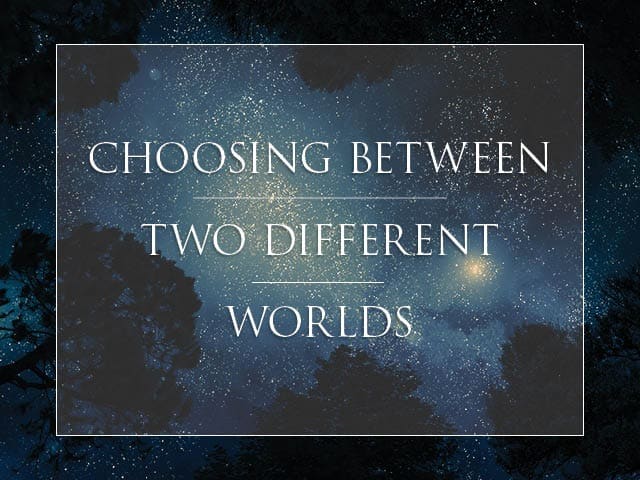As believers in Jesus Christ, every day you and I are confronted by things that require us to choose between two different worlds, the eternal Kingdom of God or the world we presently live in. Those choices revolve around one question: Is my character commanded by my Master or by the mastery of the world?
In Luke 16, Jesus tells His disciples a story about an unjust steward whose master commends his crooked dealings by saying, “The sons of this world are more shrewd in their generation than the sons of light” (v. 8).
By “generation,” Jesus is not talking about a span of years, but the generation of a world that people are born into. All of us are born into this world, but when we receive new life in Jesus Christ, we are reborn, or regenerated, into another world. We choose not just a Savior, but whether we will live totally and completely of His “re-generation.” In saying “the sons of this world are more shrewd” than the children of Light, Jesus is not saying that it’s clever to cheat. He is saying that the world’s generation works their system to the max, although it ultimately catches up with them.
However, the children of Light, He says, are not as willing to fully commit to their system, to say, “Lord, everything I have is Yours: my money, my time, my priorities, my life.” Jesus concludes by saying that there is one choice that settles it all: Who do I serve?
“No servant can serve two masters; for either he will hate the one and love the other, or else he will be loyal to the one and despise the other. You cannot serve God and mammon.” (v. 13)
Mammon is used to describe the world’s spirit in all of its possessiveness, covetousness, and avarice. Specifically, it is the word that relates to money, but it’s not just about money. It’s about everything that becomes oppressive in life, stemming from fear over what we don’t have, or the lust of money, possessions, power or any of the other things we are seduced into thinking make life work.
Mammon is the name of one of the Babylonian deities goes back thousands of years before Jesus. Mammon was the god that governed all that had to do with wealth and abundance, the oppressiveness of the quest “to have.” It is the demon-god that, to this day, still plies the affairs of our world and opposes what children of Light are about. We are to be people who are no longer controlled by that oppression.
Whose steward am I?
Which world we choose always has to do with whom we have chosen to serve and how we steward what we have been given in our lives, resources and giftings. There is a point of accountability before the Lord to which all Jesus’ disciples are called. This is not about our salvation but about our stewardship. Our salvation is established when we put our faith in Jesus Christ. We are saved by grace through faith alone.
However, there is a difference between being born again and becoming a disciple of the Savior. A believer will go to Heaven. Yet, amazing numbers of believers never solve the challenges and problems of their lives on Earth, because they never commit to grow in discipleship. Growing as a disciple doesn’t mean that you never have problems; it means those problems are dealt with on completely different terms–and with very different results. Jesus calls us to become His disciples. We’re born into the Kingdom; then, He says, He wants us to become functional stewards of that Kingdom–to manage life on His terms.
Ultimately, the Bible says, all will stand before the Lord. An account of each one’s stewardship will be required both from all who receive the Savior and are eternally saved (2 Cor. 5:10), as well as from all who reject Him and are eternally lost (Rom. 2). While the eternally saved will not experience any sense of being unloved, some will stand in the presence of the Lord with a sense of embarrassment over how they wasted what was given to them (1 Cor. 3:12-14). That’s where stewardship comes into play, and whether or not they will hear the precious words, “Well done, good and faithful servant” (Matt. 25:21).
Faithfulness in finances equals fidelity in character
To have the promise of eternal life is a wonderful gift, but there is yet a place where each of us must come and make a choice, around what does my life center? What governs my priorities? What is first and foremost in everything I do? Jesus says that it begins with how we handle money:
“He who is faithful in what is least is faithful also in much; and he who is unjust in what is least is unjust also in much. Therefore if you have not been faithful in the unrighteous mammon, who will commit to your trust the true riches” (Luke 16:10-11)
Where money is managed faithfully, morality and integrity will also be managed faithfully. Watch how a person handles their money, and you will realize money and life are more approximate than we tend to think. People say, “Well, life’s not about money.” No, but money is about life. Your paycheck reflects a dollar value in direct proportion to some investment of your skill, your gifts or your time. It’s not surprising that people get offended whenever you talk about money in church, because we so often want to control it on our terms, not God’s. If we do that, there will be other things we choose to control on our own terms instead of His.
We can choose, as the unjust steward in this text does, to live a disordered life that wastes, or a dishonest life that is characterized by self-centeredness. Or, we can choose the discerning life of wisely and righteously stewarding what we have been given. Further, we can handle money in a way that acknowledges its temporal quality, as we seek the eternal security that outlasts anything in this life. When we are faithful in stewarding temporal things by eternal values, it releases new dimensions of understanding and effectiveness.
Discover the true riches
Jesus tells His disciples, if you don’t learn to manage things rightly, starting with your money, how will you ever discover the true riches? In part, the true riches are the Lord’s promises of provision, which are fulfilled as we grow in a giving spirit and are obedient to His call to tithes and offerings.
“Give, and it will be given to you: good measure, pressed down, shaken together, and running over will be put into your bosom. For with the same measure that you use, it will be measured back to you.” (Luke 6:38)
In faithfulness to His Word, the Lord emphasizes the importance of how we manage what He has givens us by promising, He will flourish us. We make the decision of whether we trust that, but that’s the least of His promises. The true riches are also the stability and strength of our Living God flowing through your life at every dimension. It is the wealth He works in your character that flows out of you and invests in your children, your spouse, your neighbors and in your job. It is the wealth that enables you to speak life to people who, in turn, trust you and are willing to listen to you because the integrity of your character backs that up.
That happens in us when we choose to function as children of the Light, to become Jesus’ disciples, to receive His promises and to live wholly and completely as a person of His world.





